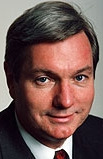Michael Osterholm, a professor of environmental health sciences at the University of Minnesota and an international expert on infectious diseases, will speak Oct. 8 in a forum on groundwater quality and sustainability.
The forum, sponsored by three League of Women Voters chapters and the Freshwater Socitey, is free and open to the public. It will be at 7 p.m. in the Gray Freshwater Center, 2500 Shadywood Road, Excelsior, Minn.
Osterholm, a passionate advocate for protecting the groundwater most Minnesotans depend on for their drinking

water, will speak on the intimate connection between ground and surface waters and the contamination threats our underground aquifers face from all the drugs and personal care products we put in or on our bodies, and all the chemicals we use in industry and agriculture.
Osterholm is director of the University of Minnesota’s Center for Infectious Disease Research and Policy and director of the Minnesota Center of Excellence for Influenza Research and Surveillance. If you have followed national reports of the H1N1 flu epidemic, you have seen or heard him quoted.
One of Osterholm’s passions is protecting and restoring the streams and underground water resources in the Karst regions of southeastern Minnesota and northwestern Iowa. He has worked to restore three trout streams that flow through his Prairie Song Farm in Iowa.
He also is a member of the Guardianship Council, a Freshwater Society advisory group that in 2008 produced an extensive report on the quality and sustainability of both ground and surface waters in Minnesota.
His lecture is sponsored by three League of Women Voters chapter – South Tonka, Wayzata-Plymouth and Eastern Carver County — and the Freshwater Society. It is the second lecture in a series. In the first lecture May 21, Freshwater Society President Gene Merriam and Glenn Skuta of the Minnesota Pollution Control Agency talked about surface water pollution.
Osterholm will talk about the contamination of drinking water by industrial chemicals and agricultural fertilizers, pesticides and herbicides. He will talk about the difference in quality between groundwater that, in some places, is thousands of years old and the water, in other places, that fell as rain or snow in the last decade. And he will talk about a new class of pollutant – endocrine disruptors – that threaten to interfere with the hormonal systems that regulate the lives of fish, animals and humans.
For more information, go to www.freshwater.org or contact Patrick Sweeney, psweeney@freshwater.org , 952-471-9773. Or Patricia Hauser, South Tonka League of Women Voters, 952-470-0132.